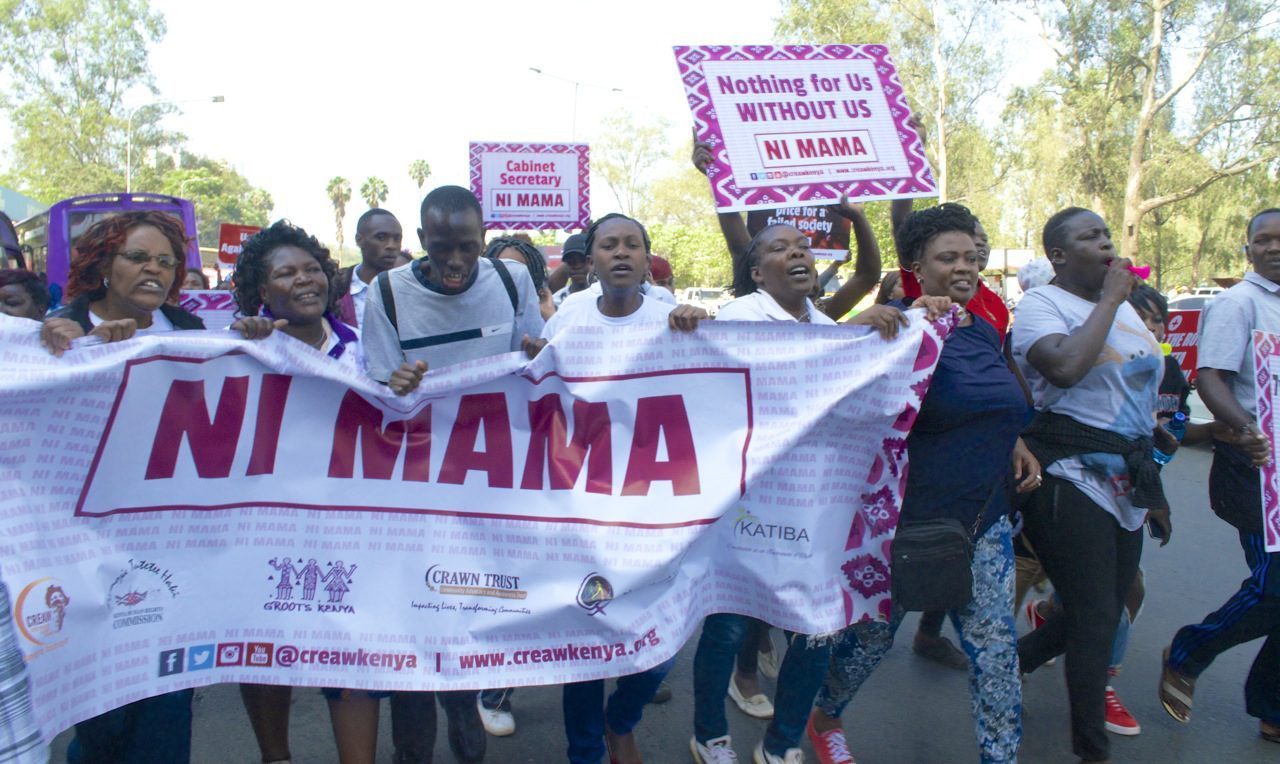By Christine Ogutu
With the new Constitutional dispensation in 2010, the women of Kenya were hopeful of a new beginning that would enable them participate in the democratic governance of the country.
The Constitution of Kenya 2010 created avenues necessitating an affirmative action aimed at reducing gender imbalances in leadership positions. Article 26 (6), 27 (8) and 81(b) postulates that not more than two-thirds of the members of any elective or appointive positions shall be of the same gender.
Seven years down the line, the provisions of the Constitution are yet to be met. Women representation in public bodies and Parliament remains minimal owing to the lack of political good will in providing legislative mechanisms for the realization of the two-thirds gender principle.
“ For too long, the women of Kenya have been intentionally excluded from decision making processes, deliberately denied the right to be fully represented in Parliament and constantly overlooked with regards to positions of appointment to public office,” said the women in a statement delivered to the Office of the President during a march on January 22 along the streets of Nairobi.
The women who were joined by CREAW, FEMNET, Groots Kenya, Katiba Institute, Kenya Human Rights Commission and the Women Empowerment Link among other concerned rights groups and Kenyans of goodwill took to the streets in protest of the continued discrimination and exclusion of women from the governance processes.
The women stated that “whereas it is clear in Law and Courts decisions that there can not be more than two-thirds of any gender in elective and appointive positions, the principle has not been adhered to in Parliament nor has it been given any consideration in the ongoing appointments of the Cabinet.”
Currently there are 76 women in the National Assembly, which is 41 short of the required number. In the Senate, there are 21 female senators, which is also two short of the required number resulting into an improperly constituted parliament as per the Constitution.
“We find it unconscionable, disrespectful and an affront to the women, that more than 7 years since the  promulgation of the Constitution, women are still forced to agitate for their right to political participation and equitable representation in Parliament and in the Executive,” read the statement in part.
promulgation of the Constitution, women are still forced to agitate for their right to political participation and equitable representation in Parliament and in the Executive,” read the statement in part.
Recently in his first batch of nominees to Cabinet, the President dropped all women in his earlier Cabinet, naming only men. This, women said is a dishonor to the gains made by the women movement since independence.
“The President, Parliament and Political class must stop sacrificing women for political expediency and wake up to the realization that women remain vigilant and will continue to seek accountability for the implementation of the Constitution,” said Beatrice Kamau who read the statement on behalf of the women.
She added: “The remaining appointments to the Cabinet must therefore be made with uttermost regard to the principle of the not more than two-thirds as enshrined in the Constitution and fulfill the directives of the Court which also found the previous Cabinet to be unconstitutional.”
In the march, the women sought to remind Parliament of its duty as a legislative body to enact the necessary legislations for the actualization of the two-thirds principle. This they say will bridge the gaps that have for a long time denied women their spaces at the decision-making tables.
In march, the women also petitioned the Inspector General of the Police, Joseph Boinet to speed up investigations on the alleged sexual violence against nursing mothers at the Kenyatta National Hospital(KNH) and bring perpetrators to book.
“KNH is an institution in a position of authority and trust and therefore owes a duty of care to its patients. It therefore follows that the administration should have systems and structures that protects vulnerable patients and responds to any acts or omissions that breach the duty of care,” read the petition.
The concerned women of Kenya said that it was insensitive and unethical for the hospital administration to casually deny the claims of sexual assault as no survivor had come forward to report any of such cases.
“It is not enough for the Cabinet Secretary of Health Cleopa Mailu to order for investigations without himself visiting the hospital to ascertain the veracity of the allegations and satisfy himself that all the measures are being taken by the hospital to secure the safety of patients and ensure full cooperation of hospital staff in bringing forward evidence concerning the allegations,” said the women.

